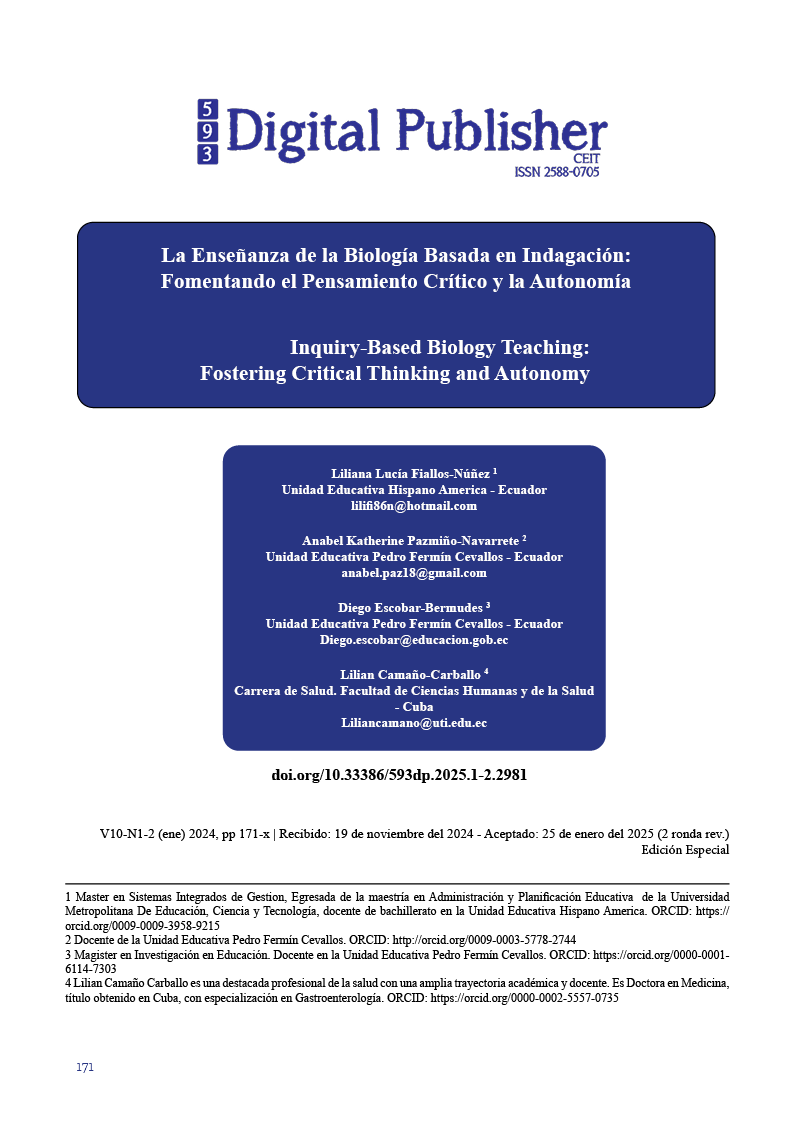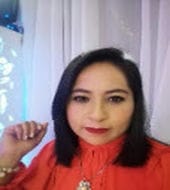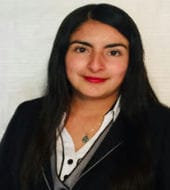Inquiry-Based Biology Teaching: Fostering Critical Thinking and Autonomy
Main Article Content
Abstract
Introduction: Inquiry-based teaching strategies have recently introduced innovation in teaching and learning methods in biology, promoting active and meaningful learning among students. The integration of critical thinking, investigative curiosity, and problem-solving skills is essential. Therefore, connecting scientific concepts with real-world problems and the educational environment becomes highly relevant. Objective: This study analyzes the impact of inquiry strategies on biology learning. Methodology: A bibliographic and content analysis was conducted, examining research and educational experiences from diverse contexts. Results: The implementation of inquiry-centered methodologies leads to significant improvements in critical reasoning, ecological awareness, and the development of scientific research and communication skills. Challenges such as limited resources and the need to redefine the dynamics between teachers and students were identified. Tangible solutions, including material adaptation and the incorporation of local issues, were proposed. Conclusion: Inquiry in biology provides essential knowledge, fosters autonomy and critical thinking, and strengthens collaboration between teachers and students. Despite its challenges, its implementation represents a powerful tool to transform the educational process and prepare students for a complex and ever-evolving world.
Downloads
Article Details

This work is licensed under a Creative Commons Attribution-NonCommercial-ShareAlike 4.0 International License.
1. Derechos de autor
Las obras que se publican en 593 Digital Publisher CEIT están sujetas a los siguientes términos:
1.1. 593 Digital Publisher CEIT, conserva los derechos patrimoniales (copyright) de las obras publicadas, favorece y permite la reutilización de las mismas bajo la licencia Licencia Creative Commons 4.0 de Reconocimiento-NoComercial-CompartirIgual 4.0, por lo cual se pueden copiar, usar, difundir, transmitir y exponer públicamente, siempre que:
1.1.a. Se cite la autoría y fuente original de su publicación (revista, editorial, URL).
1.1.b. No se usen para fines comerciales u onerosos.
1.1.c. Se mencione la existencia y especificaciones de esta licencia de uso.
References
Acosta Faneite, S. F. (2022). La gamificación como herramienta pedagógica para el aprendizaje de la biología. Revista Latinoamericana Ogmios, 2(5), 249–266. https://doi.org/10.53595/rlo.v2.i5.036
Acurio, B., & Nuñez, A. (2019). Creo, juego y aprendo con estrategias y recursos para mejorar la comprensión lectora. 593 Digital Publisher CEIT, 44–59. https://doi.org/10.33386/593dp.2019.2.87
Alarcón Goméz, R. D. P. (2013). Mi práctica en la Escuela Pedagógica Experimiental (EPE), una aventura por comenzar. Revista Bio-Grafía Escritos Sobre La Biología y Su Enseñanza, 6(10), 68. https://doi.org/10.17227/20271034.vol.6num.10bio-grafia68.75
Arboleda, J. C. (2023). Prácticas pedagógicas, motivación y pensamiento crítico. Revista Boletín Redipe, 12(8), 14–17. https://doi.org/10.36260/rbr.v12i8.1986
AYDIN, A., & GÖKTAŞ, Y. (2023). Examining the Effects of Physical Variables in Classrooms on Students’ Attention via the Internet of Things. Participatory Educational Research, 10(1), 160–177. https://doi.org/10.17275/per.23.9.10.1
Baig, M., Boned, P., González-Ceballos, I., & Esteban-Guitart, M. (2023). Artefactos identitarios multimodales 2.0 como mecanismo de personalización del aprendizaje en educación superior. Un estudio cualitativo. RIED-Revista Iberoamericana de Educación a Distancia, 26(2), 27–44. https://doi.org/10.5944/ried.26.2.36227
Bermudez, G. M. A., De Longhi, A. L., Díaz, S., & Gavidia Catalán, V. (2014). La transposición del concepto de diversidad biológica. Un estudio sobre los libros de texto de la educación secundaria española. Enseñanza de Las Ciencias. Revista de Investigación y Experiencias Didácticas, 32(3), 285–302. https://doi.org/10.5565/rev/ensciencias.1129
Cadena-Zambrano, V., & Nuñez-Naranjo, A. (2020). ABP: Estrategia didáctica en las matemáticas. 593 Digital Publisher CEIT, 1(5), 69–77. https://doi.org/10.33386/593dp.2020.1.184
Cárdenas-Cordero, M. A., Garcia-Herrera, D. G., Castro-Salazar, A. Z., & Erazo-Álvarez, J. C. (2020). Aprendizaje basado en problemas como estrategia didáctica para mejorar la comprensión lectora. CIENCIAMATRIA, 6(1), 436–463. https://doi.org/10.35381/cm.v6i1.341
Castillo Bustos, M. R., & Núñez Naranjo, A. (2023). Psychopedagogy and the Fields of Action of Educational Psychologists. Journal of Higher Education Theory and Practice, 23(14). https://doi.org/10.33423/jhetp.v23i14.6381
Farfán-Pimentel, J. F., Candia-Menor, M. A., Manchego-Villarreal, J. L., Delgado-Arenas, R., Ormeño-Gonzales, M. M., M Reina, W. O., Quispe-Vargas, E. A., & Peña-Cotrina, A. I. (2023). Laboratorios Virtuales en la Enseñanza de la Física: Un Análisis Teórico. Ciencia Latina Revista Científica Multidisciplinar, 7(4), 7117–7128. https://doi.org/10.37811/cl_rcm.v7i4.7466
Fernández, G. M. C., Vallejo, N. C. R., & Moncayo, C. T. (2022). Inteligencias múltiples y el desarrollo de competencias lectoras. AlfaPublicaciones, 4(4), 29–47. https://doi.org/10.33262/ap.v4i4.283
Forero Romero, A., Rodríguez Hernández, A. A., Maldonado Granados, L. F., Vargas Hernández, M. Á., Oliva, H. A., Melo Niño, D. S., Álvarez Araque, W. O., Romero Valderrama, A. C., & Ducuara Amado, L. Y. (2021). Estrategias pedagógicas innovadoras con TIC. Estrategias Pedagógicas Innovadoras Con TIC., 6, 56–77. https://doi.org/10.19053/9789586605939
Giler-Medina, P., & Bravo-Cedeño, J. (2024). Competencias socioemocionales y autorregulación del aprendizaje en estudiantes de bachillerato. Revista Científica y Arbitrada de Ciencias Sociales y Trabajo Social: Tejedora, 6(12ep), 80–97. https://doi.org/10.56124/tj.v6i12ep.0102
Gómez Ochoa de Alda, J. A., Marcos-Merino, J. M., Méndez Gómez, F. J., Mellado Jiménez, V., & Esteban, M. R. (2019). Emociones académicas y aprendizaje de biología, una asociación duradera. Enseñanza de Las Ciencias. Revista de Investigación y Experiencias Didácticas, 37(2), 43–61. https://doi.org/10.5565/rev/ensciencias.2598
González Montoya, C., Puerta Castrillón, V. Y., & Chamorro González, C. L. (2022). Principales retos de la profesión contable desde las perspectivas económica, digital y científica. Revista Visión Contable, 24. https://doi.org/10.24142/rvc.n24a3
Granados López, H., & García Zuluaga, C. L. (2016). El modelo de aprendizaje experiencial como alternativa para mejorar el proceso de aprendizaje en el aula. ÁNFORA, 23(41), 37–54. https://doi.org/10.30854/anf.v23.n41.2016.140
Guanche Martínez, A. (2005). La enseñanza problémica de las Ciencias Naturales. Revista Iberoamericana de Educación, 36(6), 1–23. https://doi.org/10.35362/rie3662785
Israel, C., Solano, H., García, B. L., Alfredo, B., Cortes, A., Osvaldo, S., Chavolla, M., Cruz, S. G., Espinoza, F. M., Garcia, L., Cruz, G., & Macías, S. Y. (2021). Paradigmas de la Discapacidad y su Vigilancia Epistemológica. Raes, 13(23), 119–135.
López-Sánchez, J. A., Mesa-Gallego, C., Hernández-Ortiz, J., & Rojas-Arias, J. P. (2024). Tendencias en competencias de innovación y emprendimiento en IES. Journal of Economic and Social Science Research, 4(3), 165–181. https://doi.org/10.55813/gaea/jessr/v4/n3/115
Muñoz-Guevara, E., Velázquez-García, G., & Barragán-López, J. F. (2021). Analysis on the technological evolution towards Education 4.0 and the virtualization of Higher Education. 2, 1–14.
Naranjo-Tamayo, D. C., & Carrero-Delgado, A. (2017). Retos y desafíos de la Educación rural para niños y jóvenes en escenarios de Construcción de Paz: una mirada desde lo local para la transformación global. Prospectiva, 95–120. https://doi.org/10.25100/prts.v0i24.4546
Neira Piñeiro, M. del R., Pérez del Moral, M. E., & Coto, I. F. (2019). Aprendizaje inmersivo y desarrollo de las inteligencias múltiples en Educación Infantil a partir de un entorno interactivo con realidad aumentada. Magister : Revista de Formación Del Profesorado e Investigación Educativa, 31(2), 1. https://doi.org/10.17811/MSG.31.2.2019.1-8
Nunez-Naranjo, A. (2022). Constructivist Didactics in the Teaching-Learning Process. 2022 IEEE 2nd International Conference on Advanced Learning Technologies on Education & Research (ICALTER), 1–4. https://doi.org/10.1109/ICALTER57193.2022.9965075
Núñez-Naranjo, A. F., Urgilez, E., Pérez-Narváez, M., & Escobar-Bermudes, D. (2024). Learning Service: Transforming Secondary Education. 2024 IEEE Eighth Ecuador Technical Chapters Meeting (ETCM), 1–5. https://doi.org/10.1109/ETCM63562.2024.10746140
Peralta Lara, D. C., & Guamán Gómez, V. J. (2020). Metodologías activas para la enseñanza y aprendizaje de los estudios sociales. Sociedad & Tecnología, 3(2), 2–10. https://doi.org/10.51247/st.v3i2.62
Reyes Aguilera, E. A. (2020). Prácticas de laboratorio: la antesala a la realidad. Revista Multi-Ensayos, 6(11), 61–66. https://doi.org/10.5377/multiensayos.v6i11.9290
Rodríguez Chávez, M. H. (2021). Sistemas de tutoría inteligente y su aplicación en la educación superior. RIDE Revista Iberoamericana Para La Investigación y El Desarrollo Educativo, 11(22). https://doi.org/10.23913/ride.v11i22.848
Ur Rehman, A., Aslam, E., & Iqbal, A. (2022). Intellectual capital efficiency and bank performance: Evidence from islamic banks. Borsa Istanbul Review, 22(1), 113–121. https://doi.org/10.1016/j.bir.2021.02.004
Vázquez-Ben, L., & Bugallo-Rodríguez, Á. (2018). El modelo de evolución biológica en el curriculum de Educación Primaria: Un análisis comparativo en distintos países. Revista Eureka Sobre Enseñanza y Divulgación de Las Ciencias., 15(3), 1–13. https://doi.org/10.25267/Rev_Eureka_ensen_divulg_cienc.2018.v15.i3.3101





